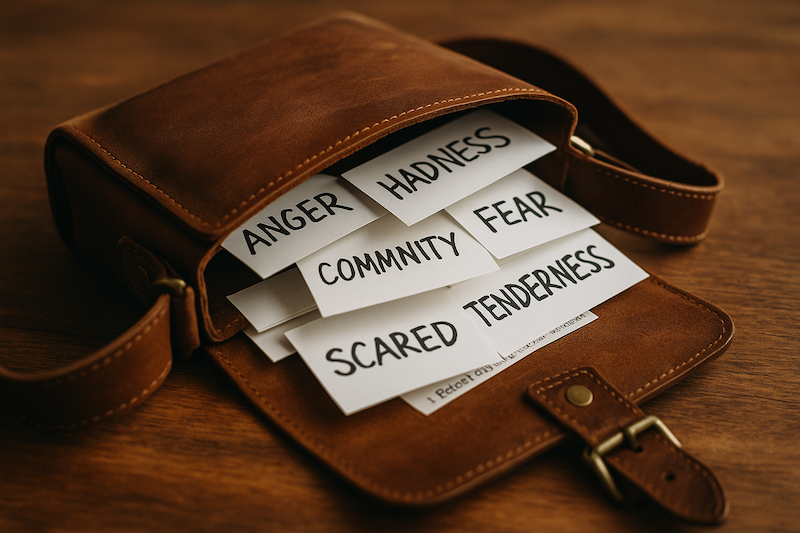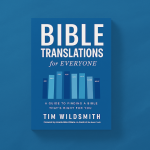
God has created us as emotional beings. Therefore, it is normal to experience and express emotions. Jesus himself “wept” (John 11:35). In fact, all of us will face many different emotions throughout the day. Some will be good, and others bad. The writer of Ecclesiastes remarks that for all of humanity there is “a time to weep and a time to laugh, a time to mourn and a time to dance” (Ecclesiastes 3:4, NIV). Tears, laughter, mourning, and dancing are all natural, created human experiences. Before the crucifixion, the Gospel of Mark tells us that even Jesus was “deeply distressed and troubled,” and that he even confessed to his closest followers, “My soul is overwhelmed with sorrow to the point of death” (Mark 14:33–34).
Emotions Are Good
Emotions are not only natural; they can be a deeply positive aspect of our lives. Today, as I was meeting with someone who began to show tears, I reassured her that tears are a good thing, and it beats the alternative of letting them compile in compartments inside our psyche and souls. Emotions can be acts of confession, surrender, release, and forgiveness, which makes them instruments of healing. For too long, churches, theological voices, and pastors have undermined the importance of emotions. Actually, the scriptures call us to celebrate and mourn with those who are experiencing the emotions of celebration and grief (Romans 12:15). On the flip side, I do believe that one can be too emotional to the point that it cripples them in an unhealthy emotional state. Emotions can be deeply detrimental if they become a trap or an imprisonment of anxiety that keeps us from moving forward. To be anxious is normal; to be ruled by anxiety is not beneficial—which is why Jesus often challenges the crippling anxiety or concern of his followers, and why Paul writes, “Do not be anxious about anything, but in every situation, by prayer and petition, with thanksgiving, present your requests to God” (Phil. 4:6–7).
It Is Important To Be Aware of Our Emotions
It would be better for us to learn to inventory the emotions we are experiencing and expressing, rather than trying to control, limit, or even force our emotions. Undoubtedly, throughout our day, we will experience a variety of stresses, tensions, wins, and emotions. Each of these experiences will unknowingly affect our being (spirit, soul, body) in both positive and negative ways. As we experience these moments in liminal spaces where we cannot safely express or process our emotions, they become items that we throw into our knapsacks or backpacks. I like the word satchel to describe our emotional backpacks that we carry each day. A satchel is a bag, typically made of leather or fabric, with a shoulder strap that allows it to be worn across the body or over one shoulder. It often has a flap that folds over the top and fastens in the front, making it ideal for carrying books, documents, or personal items. Throughout the day, in each of our experiences, we throw open that flap and put in our experiences and emotions for later—and sadly, we hardly ever come back to process them. By the end of the day, our beings are weighted down by our stresses, tensions, wins, and emotions.
Life Isn’t Meant To Be Unexamined
I do not believe our being is meant to function like a satchel. While stresses, tensions, wins, and emotions are a normal part of life, we are not meant to be weighed down or crippled by them. For this reason, it is vitally important that we learn how to take off those satchels and carefully inventory the experiences and emotions we’ve “stuffed” into them throughout the day or week—so we don’t continue carrying that weight unnoticed. Just as Corrie Ten Boom once said, “The only way to get rid of bitterness is to surrender it,” I believe the only way to avoid being ruled, overwhelmed, or crippled by our emotions is to inventory them, process them, and ultimately surrender them.[1] Regular practices and habits can help us to inventory our emotions.
Developing SATCHELS With A Purpose
A few years ago, my oldest daughter was having a hard time expressing her emotions. When I picked her up from school and asked how her day was, she would respond with an overwhelming and visceral emotional reaction. She didn’t know how to express all that she had experienced, and sadly, she was anxiously afraid of saying the wrong thing or inadvertently misspeaking about her day. I didn’t parent this well at first—I tried to control it and teach her to control it. There were many moments when I was frustrated, confused, and concerned. However, some time after that, I developed a pattern that we used for about a year and a half to help her process her day at the dinner table—SATCHELS. It was about learning to take the satchel off our shoulders and reflect on the day using a simple, helpful framework.
While we have not used this framework at the table much anymore, thankfully because she has progressed, it is still a practice that I have used with guests that I meet with at Water Street Mission from time to time. It is also a framework that I occasionally remind guests of, to be mindful of, before they approach the scriptures, a chapel gathering, or a spiritual practice. Being aware of what we are carrying is important for our inner lives. However, being aware of what we are carrying and unconsciously experiencing will help us to be aware of it so that it will not affect our reading of the scriptures. In the Five Love Languages, author Gary Chapman points out that “Our actions are influenced by the model of our parents, our own personality, our perceptions of love, our emotions, needs, and desires.”[2] In a similar way, our actions – including reading the scriptures – will be influenced by the emotions we are carrying and experiencing. Our emotions can become a hermeneutic for how we read and understand the scriptures. Hermeneutics is a methodology of interpretation, especially of biblical texts, wisdom literature, and philosophical texts. Reading through our unconscious anxieties and emotions can become an unhelpful lens by which we are unknowingly reading and understanding the scriptures. This is where SATCHELS can be a helpful practice before reading the scripture.
The Practice of SATCHELS
The practice of SATCHELS helps us unpack the experiences we carry—often weighty experiences that quietly shape our relationships, paradigms, and approach to new situations. I truly believe that if we don’t regularly take inventory of our experiences and process them, our bodies can become unconsciously weighed down, like a satchel filled with books.
SATCHELS is an acrostic—each letter represents a word that invites reflection and exploration. While this acrostic doesn’t encompass all human emotions and won’t unpack everything we’re carrying inside, it does important work on the majority of what we are facing each day. It prompts us to pause, take inventory, and offer our experiences in a confessional awareness and prayer to God the Father. I consider SATCHELS a form of confession—and confession, I believe, is one of the instruments God uses for healing in our lives. In learning to confess our sins to ourselves, others, and God – giving our inner lives into communal accountability, we can experience healing (James 5:16).
- S – Where did you experience or express Sadness today & why?
- A – Where did you experience or express Anger today & why?
- T – Where did you experience or express Tenderness today & why?
- C – Where did you experience or express Communion with God or others today?
- H – Where did you experience or express Happiness today & why?
- E – Where did you experience or express Excitement today & why?
- L – Where did you experience or express Learning something new today?
- S – Where did you experience or express being Scared today & why?
In teaching couples to be better at conversation—especially at home after a hard day at work—Gary Chapman suggests that individuals “begin by noting the emotions you feel away from home. Carry a small notepad and keep it with you daily. Three times each day, ask yourself, ‘What emotions have I felt in the last three hours?’… Write down your feelings in the notepad and a word or two to help you remember the event corresponding to the feeling… Do that exercise three times a day, and you will develop an awareness of your emotional nature.”[3] The SATCHELS framework is a kind of notebook that helps you process the emotions you’ve felt over the past few hours. In developing that awareness, you’ll begin to recognize the lens or paradigm you might be carrying as you read, study, and seek to understand the Scriptures.
SATCHELS Is A Grounding Practice
The world of counseling and therapy often refers to these types of disciplines as grounding practices. Pamela Ebstyne King, Executive Director of the Thrive Center for Human Development, says, “Grounding practices regulate our attention, emotions, thoughts, [and] behaviors, so that we are able to set meaningful goals.”[4] In THRIVE Practices for Spiritual Health, she encourages us to reflect on our habits for “slowing down, finding meaning, and practicing gratitude.”[5] She also invites us to consider and develop “practices that help you understand who you are and gain insight into what you believe.”[6]
Sometimes Our Emotions Can Get In The Way
Being aware of what is affecting our relationship with God and the scriptures is important – and it is scriptural. Sometimes our emotions and experiences can get in the way. David models a posture of self-awareness and emotional honesty in Psalm 139:23–24, praying, “Search me, God, and know my heart; test me and know my anxious thoughts. See if there is any offensive way in me, and lead me in the way everlasting.” Similarly, the writer of Proverbs urges us to “Above all else, guard your heart, for everything you do flows from it” (Proverbs 4:23), emphasizing the importance of tending to our inner lives. The prophet Jeremiah calls God’s people to “examine our ways and test them, and let us return to the Lord” (Lamentations 3:40), reminding us that spiritual renewal begins with inner reflection. And the apostle Peter encourages us to bring our burdens before God, reassuring us that we can “cast all your anxiety on him because he cares for you” (1 Peter 5:7). Learning what to do with our emotions and the broken areas of our lives can be an important part of approaching God and the scriptures. If we want God to rule and reign in our hearts, minds, and souls—in the places we live, work, worship, and play—we must ensure that nothing else is ruling and reigning in God’s place within our lives.
Your Turn: What Are You Carrying?
In this same way, the SATCHELS framework is a practical tool for emotional inventory—helping us pause, reflect, and name what we’re carrying before we open the Scriptures or approach spiritual practices. By taking time to unpack our sadness, anger, tenderness, connection, happiness, excitement, learning, and fear, we become more attuned to how our emotions may be shaping our perception of God, others, and ourselves. Like David’s prayer, SATCHELS helps us bring our whole selves before God in honesty and openness, creating space for transformation and clarity in our spiritual journey.
As you reflect on what you’re carrying today, take a moment to pause and walk through the SATCHELS framework. What emotions have settled in your heart? What experiences might be shaping how you approach God, Scripture, or others?
Let’s make room—real, intentional space—for the rule and reign of God in our inner lives.
It is time to take off our SATCHELS and talk.
- Which part of SATCHELS resonates most with you right now?
- How do you prepare your heart before engaging Scripture?
Share your thoughts in the comments—I welcome the conversation.
If you like this article, check the archives, and make sure you sign up for my free newsletter.

[1] Corrie Ten Boom and Jamie Buckingham, Tramp for the Lord (Fort Washington, PA: Christian Literature Crusade, 1976), 49.
[2] Gary Chapman, The Five Love Languages (Chicago, IL: Northfield Publishing, 1995), 97.
[3] Gary Chapman, The Five Love Languages (Chicago, IL: Northfield Publishing, 1995), 66.
[4] Pamela Ebstyne King, THRIVE Practices for Spiritual Health (Pasadena, CA: The Thrive Center, 2023), 3.
[5] Pamela Ebstyne King, THRIVE Practices for Spiritual Health (Pasadena, CA: The Thrive Center, 2023), 3.
[6] Pamela Ebstyne King, THRIVE Practices for Spiritual Health (Pasadena, CA: The Thrive Center, 2023), 3.
[7] Henri J M. Nouwen, In the Name of Jesus: Reflections on Christian Leadership with Study Guide for Groups and Individuals (New York: Crossroad Pub. Co., 2002), 33.













